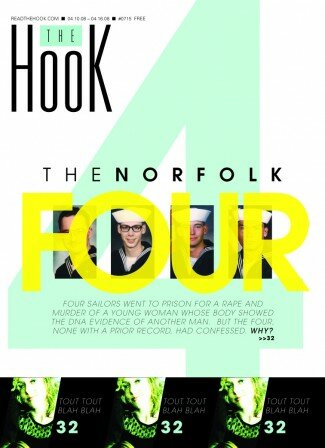Gov. Kaine pardons 3 of Norfolk Four
Governor Tim Kaine granted conditional pardons August 6 to three of the four men convicted for the rape and murder of 18-year-old Michelle Moore-Bosko in 1997.
Called the Norfolk Four, Derek Tice, Danial Williams, Joseph Dick Jr. and Eric Wilson are to many the poster children for false confession syndrome.
To Moore-Bosko's parents, however, the four sailors who confessed and were convicted of their daughter's slaying are guilty, and John Grisham's announcement that he's writing about the case is pivotal in Kaine's partial pardon.
"We do not believe it is a coincidence that Governor Kaine granted these pardons just a few weeks after the announcement that John Grisham intends to write a screenplay about this case," say Carol and John Moore, the victim's parents, in a statement to the Virginian-Pilot. "Obviously, Mr. Grisham’s wealth and influence are far more important to Governor Kaine’s political aspirations and public image than truth or justice."
Grisham was not available for comment.
Eight men were arrested for the young woman's killing and the Norfolk Four were convicted by their own confessions, even though none of them had criminal records and another man, Omar Ballard, admitted he acted alone in raping and murdering Moore-Bosko. Ballard's was the only DNA found at the crime scene.
Kaine's conditional pardon of Tice, Williams and Dick means their double life sentences are commuted to time served, but they still will remain under the supervision of the Parole Board.
"This Conditional Pardon is not a conclusive ruling of innocence, but instead adjusts the sentences of these three individuals to a more appropriate term given the doubts that surround their involvement," said Kaine in a statement.
Eric Wilson is not included in the conditional pardon because he has already served eight-and-a-half years for rape and been released.
"I think the evidence of innocence is strong and these people should have been given a full pardon," says UVA law professor Brandon Garrett, an expert in wrongful convictions. "We know confessions are unreliable and we have DNA pointing to someone else, so it's hard to understand why it was not a complete pardon."
The men filed a clemency petition in 2005 with then Governor Mark Warner, and over the years, many experts have come to believe they were victims of over zealous investigators and prosecutors.
They're not Virginia's only false confession case. Earl Washington Jr. was nine days away from execution and spent 18 years in prison before he was freed. A jury awarded him $2.25 million in May 2006 in the federal court in Charlottesville.
Updated 4:55pm Updated August 7 at 9:47am

1 comment
In reguards to the individual talked about in at the end of the article. It's sad that the average American can be forced to suffer 18 years of their life waiting to be executed behind bars and only recieve 2.2 million when the record industry may recieve a similar amount just because someone downloaded 30 or so songs and shared them. Though there is no way to prove those thirty songs cost tham that much, lawmakers see it fit to create out of proportion set amounts to ensure that peoples lives are destroyed even over $200 losses to industry. While us, the average American recieve trivial amounts for horendous suffering.